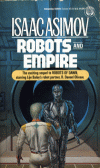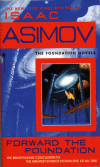At this point if you have not read The Caves of Steel, The Naked Sun, and The Robots of Dawn, this review will contain plot spoilers for those novels. I highly suggest reading both of them before even reading this review.
The events in Robots and Empire take place about 200 years after The Robots of Dawn. Elijah Baley’s victory in exonerating Dr. Han Falstofe in the death of R. Jander Parnell secured his powerful position in Auroran government. Kelden Amadiro which was implicated in the death of Jander hasn’t forgotten his bitter defeat. With his support Earth was allowed to develop its colonization plans. The number of Settler worlds is increasing, and no new settlement from Spacer worlds has taken place. Actually, Solaria has severed all contact with everyone and is rumored to be empty.
Spacers begin to see they are being surpassed in technology and military power by the short-lived Earthers they despise. Daneel and Giskard play must work to uncover a plot to destroy Earth that Kelden Amadiro has started. They are assisted by Gladia and one of Elijah Bailey’s decendents D.G. Bailey. Also, a novel in this series wouldn’t be complete without a new culture to explore. We get to see the Settler planet Baleyworld.
One of the most important themes in my opinion discussed here is what the effect of increased lifespan can do to a culture. I think Asimov has drawn his cultural picture quite well in this respect. Settlers are well suited with short lifespans to explore new worlds, while Spacers with their long lives are afraid to risk them to expand. Probably the most important question involved is Asimov’s own inspection of the Three Laws of Robotics. He uses Daneel and Giskard to question the effectiveness of the Laws. It’s interesting to see the robots debate the ramifications of their actions and what conclusions they eventually come to. I especially like this novel because by the end of it you can see how Asimov has linked his Robot series with the Foundation series.


